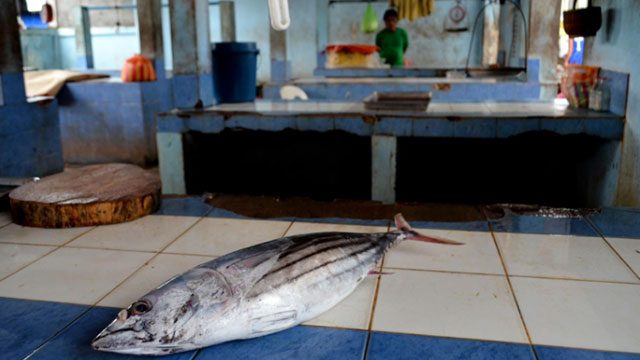SUMMARY
This is AI generated summarization, which may have errors. For context, always refer to the full article.

MANILA, Philippines – A team of marine biologists on Friday, January 12, called for stronger action to conserve and protect Philippines’ marine resources.
“We cannot let fishery resources continue to be overfished. This endangers our food security, both in the short term and in the long term, because overfishing also demolishes the ecosystems within which these resources are embedded,” the group, led by fisheries scientist Dr. Daniel Pauly, said. (READ: Why we must protect our seas)
Pauly shared his lectures on marine biodiversity conservation with stakeholders from the government, academia, and civil society groups. The lecture included how to manage fisheries and conserve the country’s vast but threatened marine ecosystems.
Threatened biodiversity
Blessed with 36,000 kilometers of coast, nearly 30,000 square kilometers of coral reefs and about 1170 square kilometers of mangroves, the Philippines is among the world’s richest countries in terms of marine biodiversity. In fact, the country is considered as the “center of the center” of marine biodiversity.
In 2014, it ranked eighth among the top fish producing countries in the world, with total production amounting to 4.7 million metric tons of seafood. (READ: Every Filipino has a role: Taking care of our oceans and seas)
However, overfishing, illegal fishing, pollution, climate change and the destruction of critical marine habitats are taking a toll on the country’s ability to produce food.
The supposed “misleading” statistics provided by Food and Agriculture Organization (FAO) on fishing does not help with the problem of overfishing, according to Pauly. Marine scientists usually depend their work on these numbers.
“The FAO data (with a few exceptions) are strongly biased downaward because most countries do not report the catch of their small-scale fisheries, nor discarded fish, nor fish that is caught illegally,” Pauly said.
This is the reason why their team has undertaken a project to “reconstruct” the image of industrial, artisanal, and recreational fisheries around the world.
Their report has shown that the catch of fisheries across the globe is not only much higher than what is being reported – the catch has also been declining in the past two decades.
Bureau of Fisheries and Aquatic Resources (BFAR) reported that 10 out of 13 fishing grounds or about 75% of the country’s fishing sites are overfished.
The University of the Philippines Marine Science Institute and the Biodiversity Management Bureau further revealed that less than 1% of Philippine coral reefs are in excellent condition – an alarming fact, taking into account that many species of fish and invertebrates live and breed in coral reefs.
Government actions
To address these issues, the Philippine Fisheries Code was amended in 2015 to strengthen enforcement efforts such as requiring fishing boats to adopt vessel-monitoring technologies.
“These alarming wake-up calls should compel all of us to work together to finally stop and eradicate illegal and destructive fishing,” Oceana Philippines Vice President Atty. Gloria Estenzo Ramos said. (READ: Focus: Marine riches of South China Sea)
She also added that coastal local government units and national agencies like the Department of Agriculture (DA), Department of Environment and Natural Resources (DENR), Department of the Interior and Local Government (DILG) and the police and armed forces must ramp-up enforcement efforts to protect the marine resources we still have.
Due to climate change, pollution, and human pressures, scientists predict that over 90% of the world’s coral reefs will vanish by 2050 – robbing people of one of the richest food-producing systems on Earth. (READ:Climate change: Why PH should care) – Rappler.com
Add a comment
How does this make you feel?
There are no comments yet. Add your comment to start the conversation.